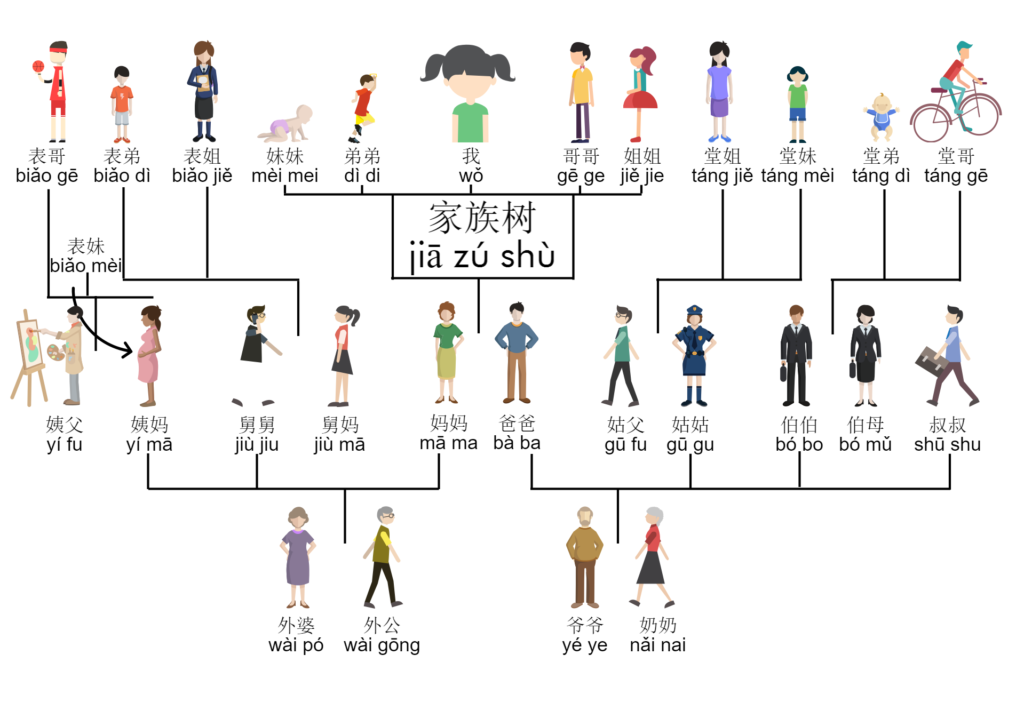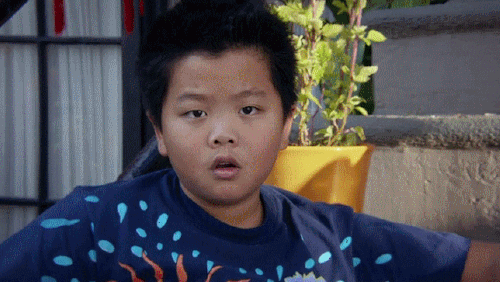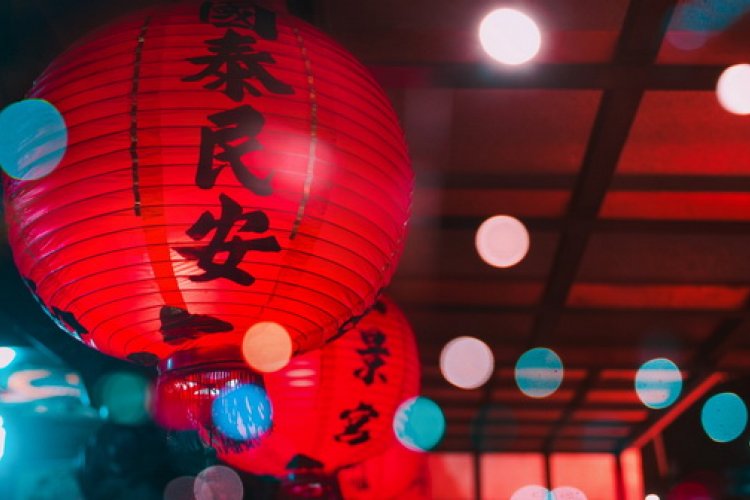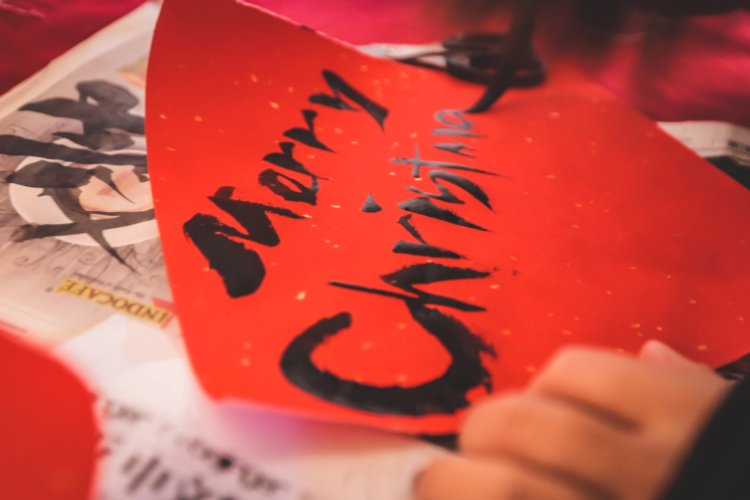您哪位? Navigating the Mental Minefield That is Chinese Kinship Terms
If meeting someone's family for the first time wasn't intimidating enough, here in China you also have to navigate the minefield of kinship terms. There is a seemingly neverending list of specific denominations for almost every position on the family tree, so complicated that even Chinese people sometimes struggle to remember the correct moniker.
Why is it so complicated? Largely because to figure out the proper way to address a family member in Chinese, you need to take several different factors into account, from the fairly obvious such as generation and gender, to the more complicated, like whether the individual is from the maternal or paternal side, whether they are a blood relative or an in-law, as well as the person’s age.

The payoff of knowing your wàipó from your nǎinai is that not only will you score some major brownie points, and extra servings of their delicious grub, because addressing family members by the correct kinship terms is seen as an important gesture to show your politeness and respect, especially among the older generation. With Chinese New Year on the horizon, there's no better time than now to brush up on your kinship terms and perhaps bag an extra hongbao or two.
Before we get into the nitty-gritty, we should add that if you're ever unsure about a person's relation, you can address them respectfully in general terms according to estimated age. As a rule of thumb, refer to your older contemporaries as 哥哥 gēgē and 姐姐 jiějiě, 45 and up as 叔叔 shūshu and 阿姨 āyí, 70 and up as 爷爷 yéyé and 奶奶 nǎinai. Of course, if you're unsure, a simple 您好 nín hǎo will do, lest you overestimate someone's age and offend them!
Immediate family members
- 爷爷 yéyé grandfather on father’s side
- 奶奶 nǎinai grandmother on father’s side
- 外公 wàigōng grandfather on mother’s side
- 外婆 wàipó grandmother on mother’s side
- 爸爸 bàba father
- 妈妈 māma mother
- 哥哥 gēgē older brother
- 弟弟 dìdì younger brother
- 姐姐 jiějiě older sister
- 妹妹 mèimei younger sister
Uncles and aunts
- 伯伯 bóbo father’s older brother
- 叔叔 shūshu father’s younger brother
- 姑夫 gūfū father’s sister’s husband
- 姨夫 yífū mother’s sister’s husband
- 舅舅 jiùjiu mother’s brothers
- 姑妈 gūmā father’s older sister
- 姑姑 gūgū father’s younger sister
- 姨妈 yímā mother’s older sister
- 阿姨 āyí mother’s younger sister
- 伯母 bómǔ father’s older brother’s wife
- 婶婶 shěnshen father’s younger brother’s wife
- 舅妈 jiùmā mother’s brother’s wife
Cousins
- 堂哥 táng gē father’s brothers’ son who’s older than you
- 堂弟 táng dì father’s brothers’ son who’s younger than you
- 堂姐 táng jiě father’s brothers’ daughter who’s older than you
- 堂妹 táng mèi father’s brothers’ daughter who’s younger than you
- 表哥 biǎo gē mother’s siblings’ and father's sisters' son who’s older than you
- 表弟 biǎo dì mother’s siblings’ and father's sisters' son who’s younger than you
- 表姐 biǎojiě mother’s siblings’ and father's sisters' daughter who’s older than you
- 表妹 biǎomèi mother’s siblings’ and father's sisters' daughter who’s younger than you
Note: For many years, it has been common practice to use 堂 to refer to those family members who share "the same bloodline" e.g. only cousins from the father's brothers' side. However, this practice is changing in some regions of China, where the family will adopt 堂 for all cousins under the same paternal grandparents.

Nieces and nephews
- 侄子 zhízi brother’s son
- 侄女 zhínǚ brother’s daughter
- 外甥 wàishēng sister’s son
- 外甥女 wàishēngnǚ sister’s daughter
In-laws
- 公公 gōnggōng husband’s father
- 婆婆 pópo husband’s mother
- 岳父 yuèfù wife’s father
- 岳母 yuèmǔ wife’s mother
- 姐夫 jiěfū older sister’s husband
- 妹夫 mèifū younger sister’s husband
- 嫂子 sǎozi older brother’s wife
- 弟妹 dìmèi younger brother’s wife
- 大舅子 dàjiùzi wife’s older brother
- 小舅子 xiǎojiùzi wife’s younger brother
- 大姑子 dà gūzi husband’s younger sister
- 小姑子 xiǎogūzi husband’s older sister
- 大姨子 dàyí zi wife’s older sister
- 小姨子 xiǎoyízi wife’s younger sister
Congratulations! You made it this far. Unfortunately, the mental gymnastics are not over yet! Adding to the already messy business of family names is the Chinese tendency to have different terms depending on which region you're in. For example, 姥姥 lǎolao and 姥爷 lǎoyé (more common in the south) as alternatives for 外婆 and 外公, respectively; 伯父 bófù as an alternative for 伯伯; 姑父 gūfù as an alternative for 姑夫; and 舅母 jiùmǔ as an alternative for 舅妈.

There's also the problem of what to do when those relatives have siblings. Luckily, this portion is less complicated – see it as the icing on the cake which you now very much deserve. Refer to the oldest sibling by adding 大 dà (big) in front of his/her title, followed by 二 èr (second), 三 sān (third), or 四 sì (fourth) etc. to the rest, depending on the order in which they were born.
Still here? We've got one final question to test whether you've truly got this pegged: how should you address your mother’s dad’s third elder brother? Post your answers below!
READ: How to Navigate Didi (and Your Driver)
More stories by this author here.
Email: kuang@thebeijinger.com
Instagram:beijinglights_
Photo: Written Chinese, Pixabay, Giphy.com







